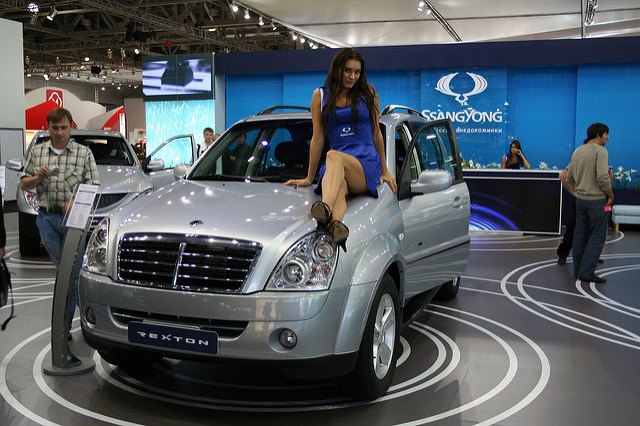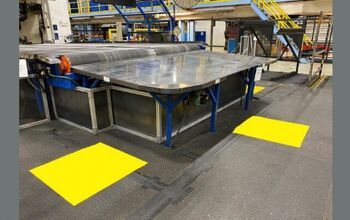TTAC News Round-up: New Salvo Hits Volkswagen, Korean Competition Looms, and Benz Big on Batteries

After seemingly using up its legal arsenal against Volkswagen, the U.S. is pulling its backup out of an ankle holster and taking another shot.
That, Kia and Hyundai might get a Korean competitor, Mercedes-Benz is feeling charged up, Audi is still a fuel cell fan, and Volvo wants to standardize EV recharging … after the break!
The hits keep coming for Volkswagen
After flexing its financial fraud law muscles during the 2008 recession, the U.S. is putting that experience to use once again against Volkswagen.
The U.S. Department of Justice has issued a subpoena under the Financial Institutions Reform, Recovery and Enforcement Act (Firrea) to target the automaker for emissions cheating, and might soon look at tax law violations, says the Wall Street Journal ( via Market Watch):
That is a novel use of the civil financial fraud law that the Obama administration deployed to extract record-setting multibillion-dollar settlements from big banks in the wake of the 2008 financial crisis. It suggests the car maker faces another potential source of penalties after admitting it used illegal software that allowed diesel-powered vehicles to pollute more on the road than during government emissions tests.
Prosecutors also have used Firrea to probe alleged misdeeds in the auto loan industry, but the Volkswagen subpoena marks the first known instance of the government using a banking law to pursue potential wrongdoing that is not directly linked to financial misconduct.
As the U.S., France and Germany expanded their actions against the embattled automaker, Volkswagen AG shares slipped over four percent yesterday.
Korean competition headed to U.S. shores?
Not since the short-lived Daewoo incursion in the late 1990s has Hyundai/Kia faced a competitor from its homeland in the U.S. market.
South Korean automaker Ssangyong Motor Company intends to make a foray into the U.S. market under a new name, possibly as early as 2019, reports Reuters ( via NBC News):
It is the first time CEO Choi Johng-sik has put a timeframe on Ssangyong Motor’s long-planned entry into the United States, as South Korea’s number four car maker tries to expand overseas to help offset a slump in its key export market Russia.
But Choi’s comments appear to contradict those of Mahindra Executive Director Pawan Goenka, who told Reuters a U.S. entry was “somewhat on the back burner”, with the priority instead being plans to build Ssangyong vehicles in China.
Choi and executives from Indian owner Mahindra & Mahindra all agree that breaking into the U.S. market will be a “tough nut to crack,” with Choi telling reporters such a venture “will make or break our company.”
The company is preparing to launch a midsize SUV that could serve as the centrepiece of its U.S. offerings.
Mercedes-Benz pours on the electrons
The need for batteries is going to be big, according to Mercedes-Benz’s parent company Daimler, so it’s building a new German factory to fuel its future vehicles, Motor Authority reports:
“To get closer to fully electric driving, we keep investing big in the key component of emission-free vehicles—powerful batteries,” Daimler CEO Dieter Zetsche said. “We are now devoting another 500 million euros to build a second battery factory in Germany.”
As mentioned, most of the batteries will end up in new hybrid and electric cars from Mercedes. A majority of the automaker’s sedans and SUVs will offer a plug-in hybrid option by the end of the decade, and the automaker is also working on a new platform for electric cars. The platform, dubbed EVA (an acronym for Electric Vehicle Architecture), will reportedly be the basis of up to four electric cars spanning both sedans and SUVs, with the first model due in 2018.
Daimler once owned a stake in Tesla Motors, and, like that company, currently produces energy storage units for use in homes and businesses.
Audi’s not giving up on a hydrogen-powered future
The buoyant element that once lifted mighty Zeppelins into German skies isn’t being abandoned by the country’s largest automaker.
Volkswagen Group has tapped its Audi division to lead development of hydrogen fuel cell technology in its quest to become an industry leader, reports Automotive News Europe:
Speaking to reporters at the brand’s headquarters here, Audi’s new development chief Stefan Knirsch defended the need to invest in fuel cell technology even as electric cars begin to gain traction in the market.
“I know there’s a big discussion ‘why fuel cells?’ if everything in the future will be [battery] electric: at some point there will be a charging infrastructure and the electric ranges will increase, so who needs fuel cell cars? But we don’t see it so black and white at the moment,” he said at a press event.
Audi unveiled its fuel cell-powered H-tron Quattro concept at the North American International Auto Show in Detroit in January, declaring its range as being 310 miles.
Knirsch has stated that fuel cell vehicles have an advantage over EVs in their quick refueling time and cheaper production costs. A production fuel cell Audi would likely be similar to the EV utility vehicle the automaker has planned for 2018.
Now that we’re all on the same plug …
Volvo is pretty pleased at its plug-in hybrid cars, and now wants to start bossing the world around.
The Swedish automaker is pushing for a global standard for electric car charging infrastructure, according to an official news release:
To support this drive towards a global standard for electric car charging, Volvo Cars has decided to throw its weight behind the Charging Interface Initiative, a consortium of stakeholders that was founded to establish their Combined Charging System (CCS) as the standard for charging battery-powered vehicles.
The CCS offers regular single-phase charging as well as three-phase rapid charging, with the possibility of an even faster charge in the future.
Volvo expects to release its first full EV in 2019 and argues that standardization is needed to eliminate the range anxiety that afflicts many EV drivers. The shadowy cabal behind CCS is currently crafting requirements for the evolution of global standards and certification for automakers.
[Image: Ssangyong, Peter PZ/ Flickr; Plug-in, © Alex L. Dykes/The Truth About Cars]

More by Steph Willems
Latest Car Reviews
Read moreLatest Product Reviews
Read moreRecent Comments
- Calrson Fan We are already seeing multiple manufacturers steering away from EVs to Hybrids & PHEVs. Suspect the market will follow. Battery tech isn't anywhere close to where it needs to be for EV's to replace ICE's. Neither is the electrical grid or charging infrastructure. PHEV's still have the drawback that if you can't charge at home your not a potential customer. I've heard stories of people with Volts that never charge them but that's a unique kind of stupidity. If you can't or don't want to charge your PHEV then just get a hybrid.
- AZFelix The last time I missed the Malibu was when one swerved into my lane and I had to brake hard to avoid a collision. 1 out of 5⭐️. Do not recommend.
- 2ACL I won't miss it; it was decent at launch, but in addition to the bad packaging, GM did little to keep it relevant in the segment. I'd prefer that another domestic automaker doesn't just give up on the mainstream sedan, but unlike some of Ford's swan songs, the Malibu made an indifferent case for why they should live.
- ToolGuy TG grows weary of purchasing gasoline. I don't care so much how or why, I am just tired of it. I still buy petroleum products, not 'boycotting oil,' but backing away from gasoline where I can. Sample size = 1.
- Probert Maybe it's not too late for the Dodge Neon I've always dreamed of!!! To the keyboard Robin!







































Comments
Join the conversation
And the Chevrolet Express is trading the 6.6l duramax for an available 2.8L duramax.
Comment that Ssangyong isn't financially stable forgets that Mahindra of India bought 70% control in 2010. Mahindra is bigger than Tata (LR Jag and awful little Nanos) in India. On the other hand, two weeks ago, Mahindra said they were going to enter the US market with this Ssangyong. Last week, they said, no, actually, we're not. This week, they're back again, so the Ditherer in Charge at Mahindra, who tried on and off for about six years to decide whether the compact Mahindra pickup would come to the USA, and finally gave up and had a beer, has not been replaced by someone who can make up his mind. Expect no Ssangyongs to ever arrive stateside, judging by past goings on.